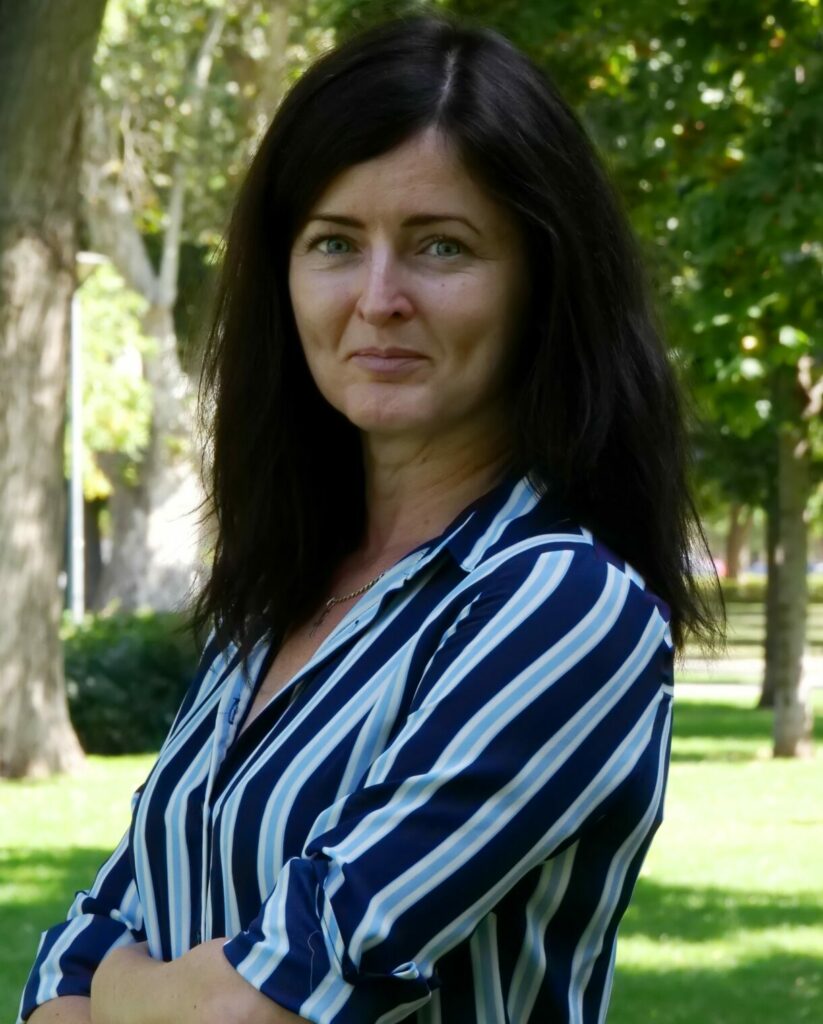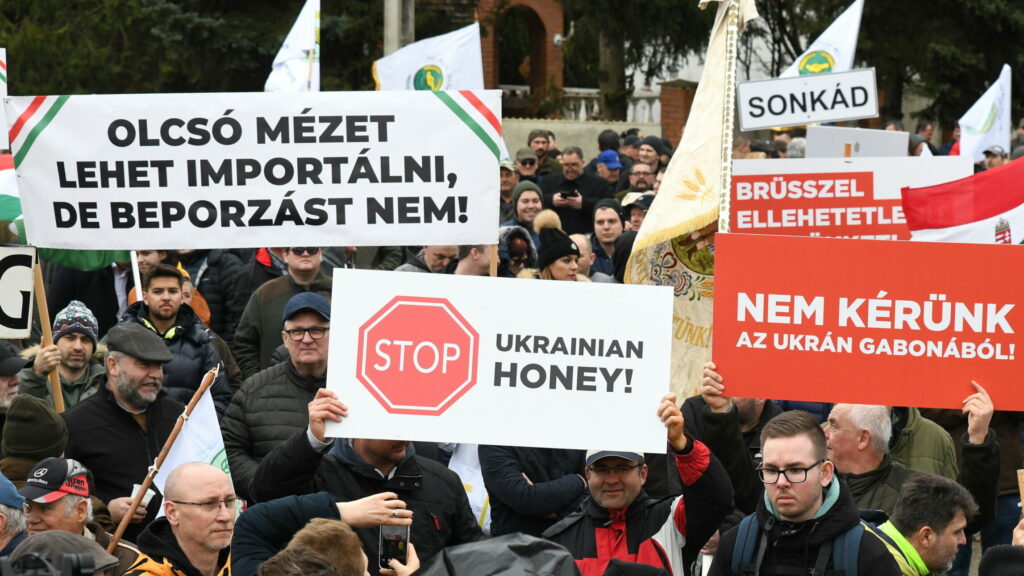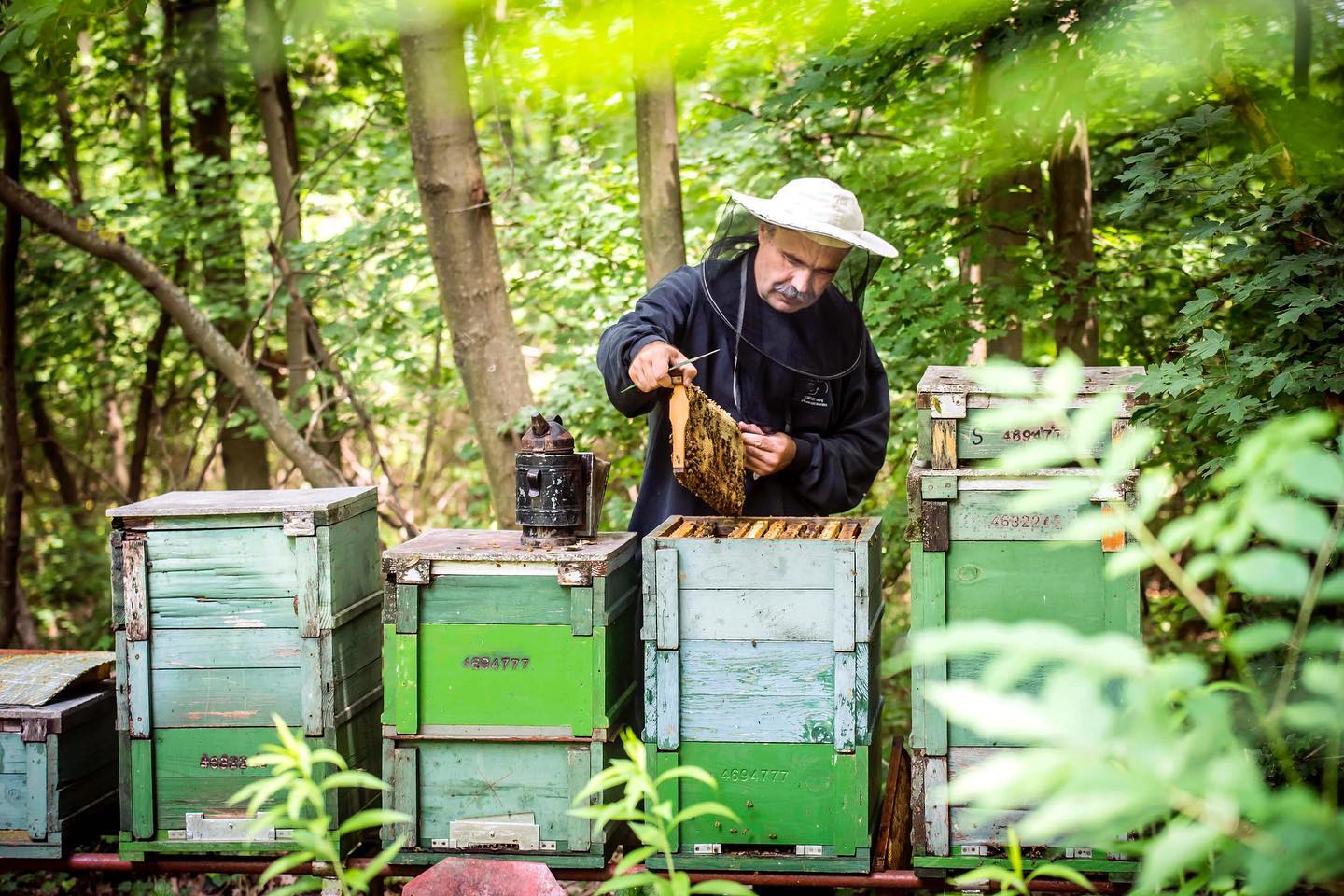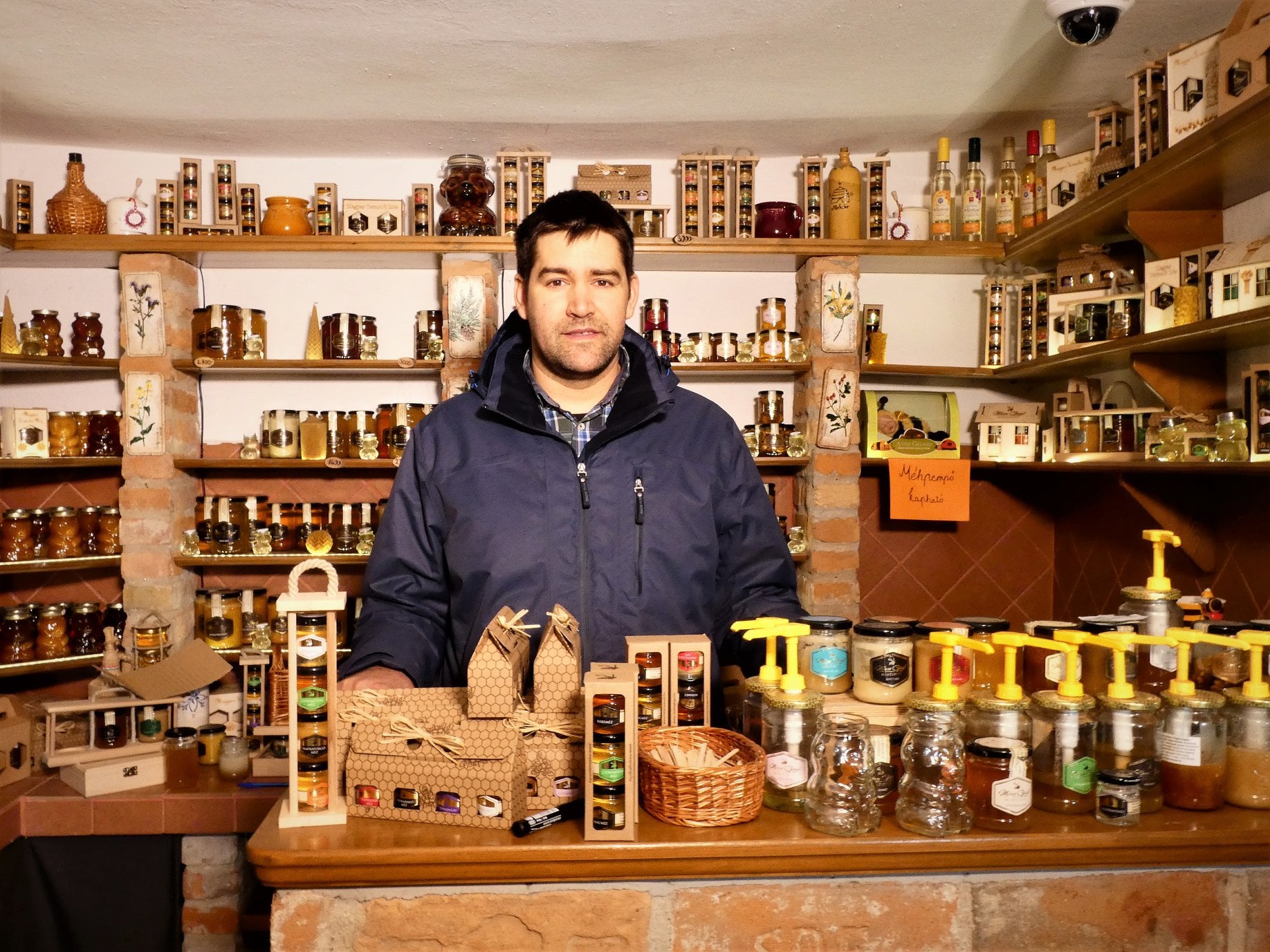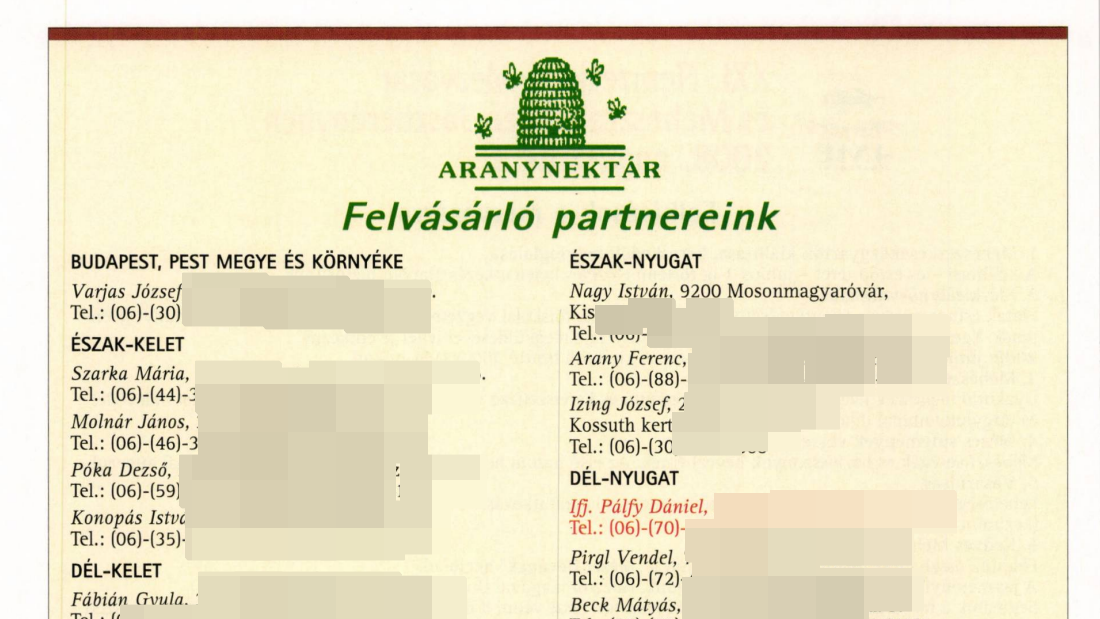The https://english.atlatszo.hu use cookies to track and profile customers such as action tags and pixel tracking on our website to assist our marketing. On our website we use technical, analytical, marketing and preference cookies. These are necessary for our site to work properly and to give us inforamation about how our site is used. See Cookies Policy
Controversy surrounds Ukrainian honey import ban lift: Beekeepers point finger at agriculture minister’s former employer
Last September, the Hungarian government extended the import ban on Ukrainian goods to a number of Ukrainian agricultural products – including honey – to protect domestic producers from the cheap Ukrainian imports. In February this year, the government lifted the ban on imports of Ukrainian honey. Honey from Ukraine is much cheaper than honey from Hungary, and Hungarian beekeepers believe their livelihoods are in danger. The Ministry of Agriculture told Átlátszó that the decision was necessary in the interests of honey packers producing honey for export. At the same time, Agriculture Minister István Nagy worked decades ago for the largest domestic honey processor.
On September 15, 2023, the Hungarian government extended the import ban on Ukrainian goods to a number of Ukrainian agricultural products – including honey – to protect domestic producers from the cheap Ukrainian imports. The move came after the EU lifted barriers on trade with Ukraine on agricultural products.

Commenting on the decision in September, Agriculture Minister István Nagy said: “If cheap Ukrainian imports flooded the markets of Member States neighbouring Ukraine again, there would be insufficient storage capacity to store the autumn harvest, sales to the domestic market would become impossible and farmers would face even greater difficulties, and we cannot stand by and watch this happen.”
In February, farmers staged a protest in Záhony against the EU’s open trade policy towards Ukraine. Many beekeepers were invited and attended – only to see their hopes slip away not 10 days later, when the Hungarian government lifted the ban on Ukrainian honey.
One beekeeper told Átlátszó that the government had “held a knife to our throats” with the move. In a petition, the beekeepers are calling on Agriculture Minister István Nagy to immediately re-ban the import of Ukrainian honey into Hungary, which appears to serve only a select group of traders.
Invitation to a protest
The backlash came after the European Commission proposed to allow Ukrainian agricultural products back into the EU market. In response, the National Chamber of Agriculture (NAK) and the Association of Hungarian Farmers’ Groups and Cooperatives (MAGOSZ) organised a farmers’ demonstration in Záhony on February 9, where thousands of Hungarian farmers protested against the decision. The National Hungarian Beekeepers’ Association (OMME) called on beekeepers to take part – and they did.
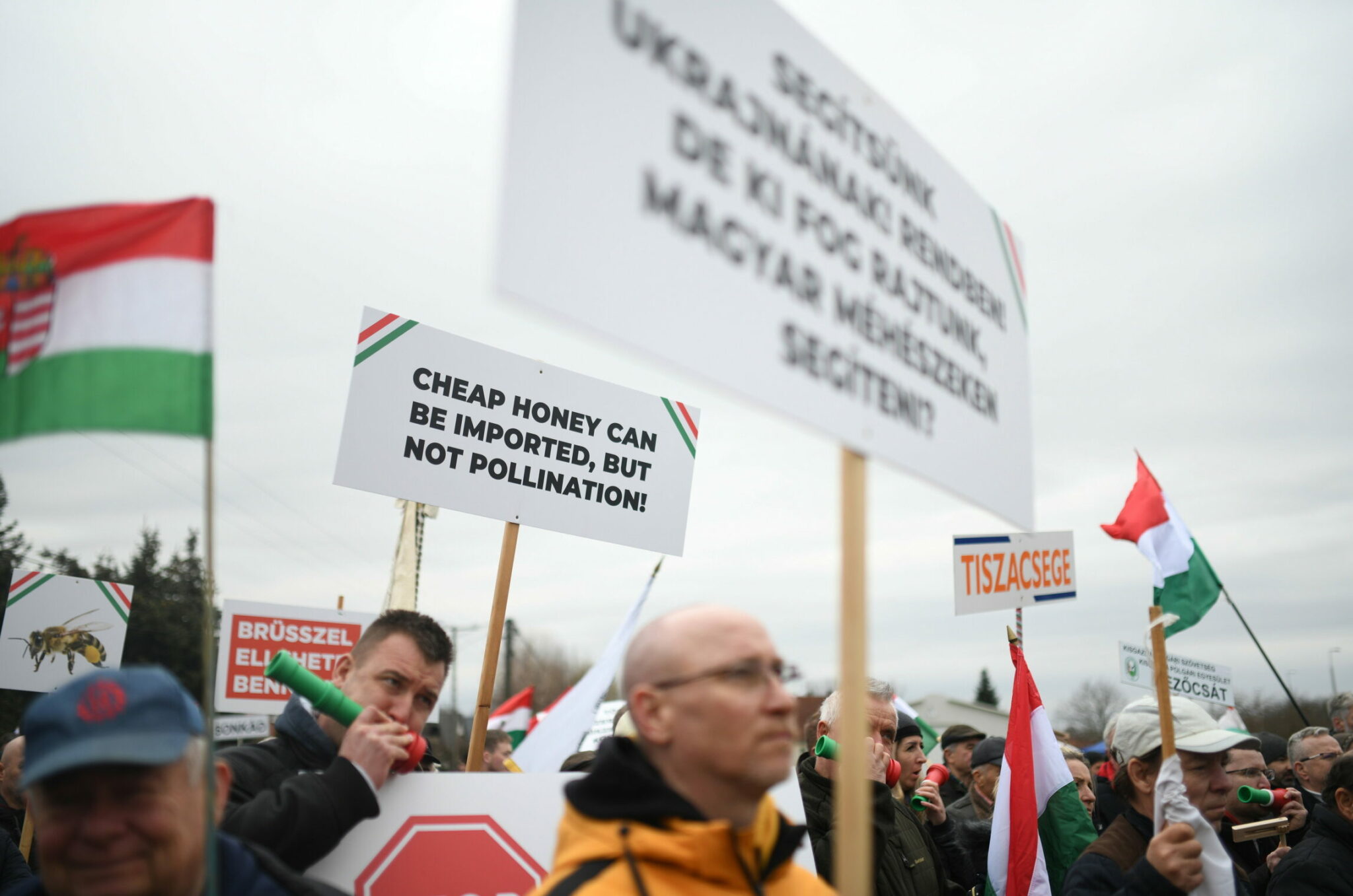
Participants of the MAGOSZ and NAK farmers’ demonstration in Záhony on 9 February 2024. (photo: MTI/Attila Balázs)
Viktor Orbán unexpectedly lifts the import ban
And then, the ban was gone as suddenly as it came. Just 10 days after the demonstration, Prime Minister Viktor Orbán signed a government decree lifting the import ban on Ukrainian honey.
As soon as the decision came to light, disappointed beekeepers started commenting on István Nagy’s Facebook page. The minister responded to the distressed beekeepers:
“We have already run out of mixed honey in our country,” he wrote, and “if we want to sell our acacia honey, we need mixed honey.”
Unfortunately, the beekeepers interviewed by Átlátszó are unanimous in saying that there is no shortage in domestic mixed honey. Au contraire – producers are stuck with barrels because they do not want to sell at the current purchase price of only HUF 600 per kilo when that quantity costs HUF 1,000. Farmers are holding on to their stocks rather than selling them to traders at a loss, at almost half the price.
Beekeepers are disappointed
Károly Varga, President of the North-Bács-Kiskun County Organisation of OMME, took an active part in the organisation of the February demonstration, and transported more than 30 beekeepers by bus to Záhony. He therefore took it as a personal blow when the government lifted the ban on Ukrainian honey imports 10 days later, which he said had killed the sector.
Varga told Átlátszó that there was a huge outcry among beekeepers from all over the country.
“After so many good decisions, this is not what we expected from the government, to put a knife to our throats slash us,” he said.
Varga, like many other beekeepers, told our newspaper that he believes the decision will benefit traders, who will be able to buy Ukrainian honey at a lower price than Hungarian honey. “They’re tightening the noose around our necks,” said the president of the 372-member organisation bitterly.
Gergő Mézes, a full-time beekeeper and owner of the Vizsoly Honey Museum, also expressed his disappointment to Átlátszó. “They send beekeepers to Záhony to protest, and then 10 days later they make a decision to lift the ban on Ukrainian honey imports – I am deeply disgusted,” he said.
Mézes, like many other beekeepers, suspects that the lifting of the import ban is in the interests of the bigger bottle producers, who would be forced to pay more for Hungarian honey should the ban be put in place.
Petitioning the Minister of Agriculture
Zoltán Pásztor, president of the Örösi Pál Zoltán Beekeepers Association in Debrecen, said that, contrary to popularly held belief, Hungarian mixed honey is nowhere close to running out.
Pásztor drafted a petition – already signed by almost 40 of something like 110 beekeepers’ associations in less than two days – asking Agriculture Minister István Nagy “to immediately reinstate the import ban on Ukrainian honey, to put the interests of domestic producers and honest honey exporters first, and not to give in to the pressure of certain privileged traders”.
The beekeepers disputed claims that acacia honey can only be sold together with mixed honey on the international market in the petition.
We asked the Prime Minister’s Office about the reason behind the change in policy. We received a reply from the Ministry of Agriculture: “The decision became necessary because, based on indications from the sector, it has become disadvantageous for Hungarian producers that Hungarian companies exporting processed honey have been placed at a substantial competitive disadvantage vis-à-vis their international competitors on EU markets due to the lack of access to imported honey, and are losing foreign customers to whom they also sell Hungarian honey.”
Running out of Hungarian mixed honey – the excuse initially posted by Nagy on Facebook – was never mentioned.
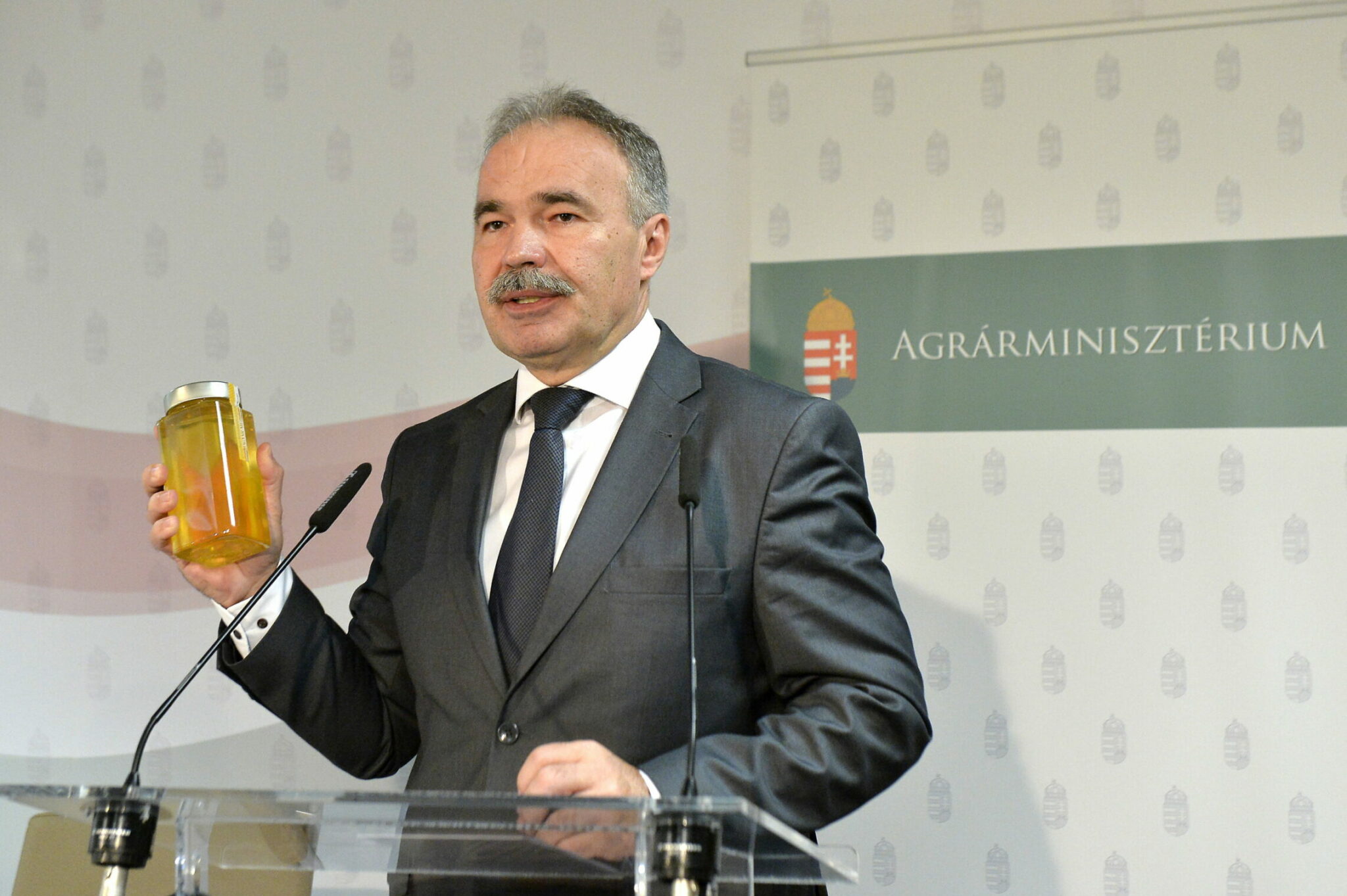
Minister of Agriculture István Nagy at a press conference in the Ministry, where the publication “In Alliance for Hungarian Honey” was presented on 10 February 2022 (photo: MTI/Lajos Soós)
The real reason – hidden motives?
It is perhaps no coincidence that, decades ago, Agriculture Minister István Nagy worked for the largest domestic honey processor, Aranynektár Ltd. The company received nearly HUF 1 billion in subsidies from the government in 2022, and now it can profit from the resale of cheap Ukrainian honey.
Nagy himself started beekeeping during his university years in Mosonmagyaróvár. His newfound passion saw him following in his grandfather’s footsteps, who was a beekeeper. Nagy founded and presided over the Hungarian Beekeepers’ Association (OMME) in Mosonmagyaróvár. As a beekeeper, he was partial to buying honey from Aranynektár Ltd. He said in an interview: “Many of my beekeeping friendships date back to this period. This period is definitely a defining one in my life.”
Indeed, his passion was immortalized in a June 2008 issue of Beekeeping Magazine, where Aranynektár lists among its buyers István Nagy from Mosonmagyaróvár in an advertisement.
At that point, as of 2006, Nagy had already risen to deputy mayor of Mosonmagyaróvár Two years after the publication of the Aranynektár ad, in April 2010, he was elected as a Member of Parliament for Fidesz-KDNP in the Mosonmagyaróvár region. In the autumn of 2010, he became mayor of the municipality with 41% of the vote.
In 2014, Nagy moved to national politics: he was re-elected as Mosonmagyaróvár’s Member of Parliament, and in June, he was appointed State Secretary. He never forgot his roots: in 2018, Aranynektár Ltd owner Ferenc Takács was awarded the Hungarian Gold Cross of Merit.
In 2018 and in 2022, Viktor Orbán appointed Nagy as Minister of Agriculture.
The Secretary of State and the production line
Since István Nagy took office in 2014, he has often communicated the importance of bees, beekeepers, beekeeping and honey. In mid-October of 2014, he announced that more development funds would be allocated to the sector in the coming years, mainly to modernise technology and equipment.
Nagy said all this in Dunavarsány at the “handover of a new line of machinery for a family-owned honey-packing company”, according to the official report. The company was Aranynektár Kft., which, according to a report on the government website, “made an investment of HUF 350 million from its own resources”.
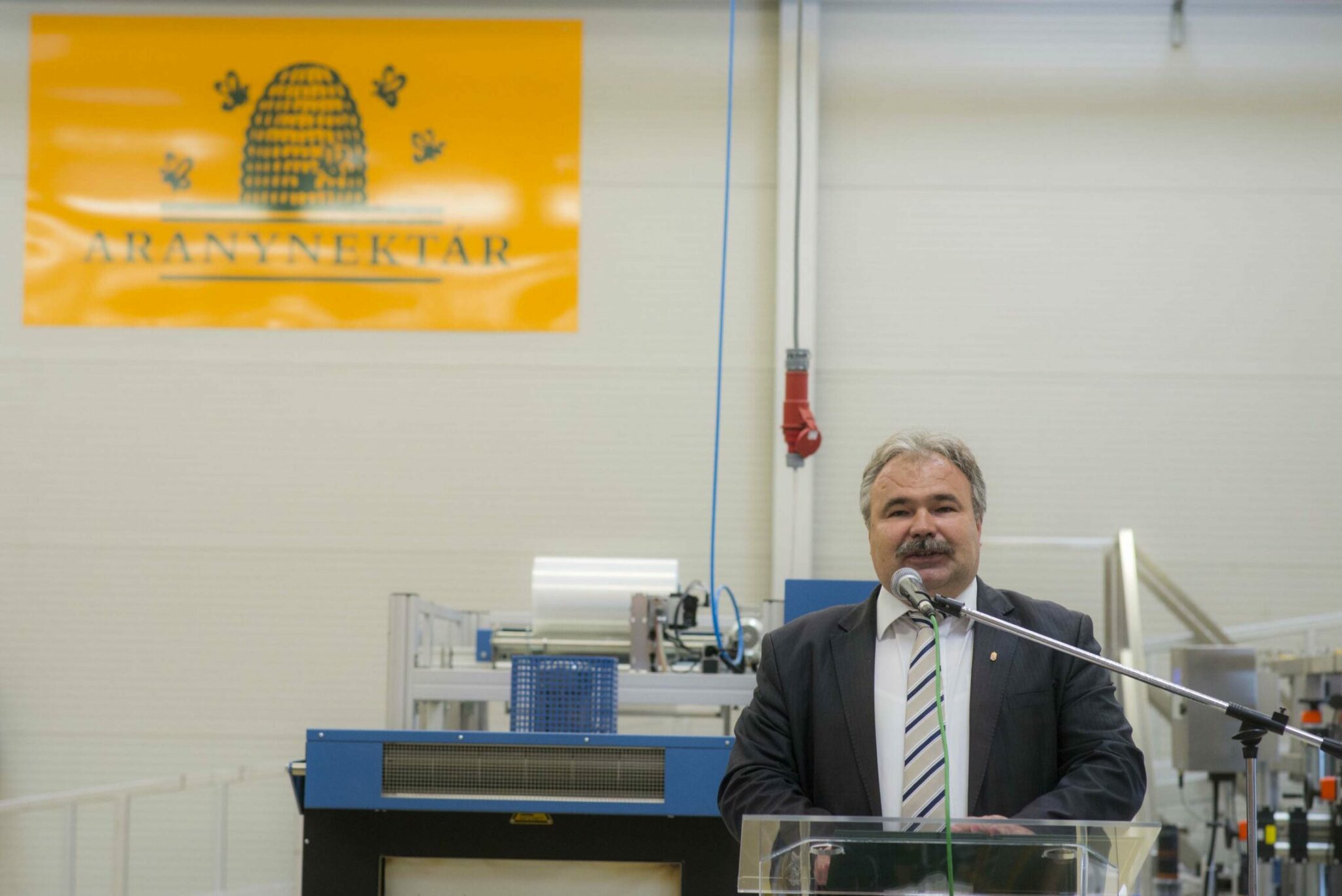
István Nagy at the inauguration of the new production line of Aranynektár Kft. in October 2014 Photo: Ministry of Agriculture
Part of the investment was “a series of machines and a laboratory to fill individually labelled glass containers and plastic bottles of honey in batches of 300 to 400 kilograms”.
The change in Aranynektár’s profile was notable. Owner Ferenc Takács, told Hvg.hu that the company went from producing large volumes to smaller quantities but with higher quality. The flexible production line, he said, allowed the company to produce different types of bottled honey.
The Minister at the Brussels protest
In November 2019, not long after István Nagy’s first ministerial appointment, the European Bees Association was founded to combat cheap low-quality Chinese products that contained sugar syrup without any appropriate indication on the packaging. Many Hungarian producers, noted the Association’s president, started to mimic the strategy.
Another plot twist: the Association’s president is Aranynektár owner and bosom buddy Ferenc Takács. Nagy was present when the Association was formed, and he pledged the government’s support for the association.
In January 2020, the Association organised a demonstration in Brussels. István Nagy, the Minister of Agriculture, also attended the demonstration and made a statement. “The European honey policy is completely unsustainable, as it does not provide sufficient protection against artificial honeys, mainly from Asia, produced under laboratory conditions, and is thus completely destroying the European honey market and honey producers,” he said. The minister pledged his support to the protesting beekeepers.
In December 2023, he announced that “at the behest of Hungary, EU agriculture ministers agreed that in the future, it should be compulsory to indicate the origin and exact percentage of honey on honey bottles”.
Generous state aid
Ferenc Takács, who founded Aranynektár Kft. in 1989, has for several years (also) been using the surname Fulmer in honour of his grandfather, a renowned beekeeper from Somogy County.
His company received HUF 324 million in EU funding under the second Gyurcsány government in 2006 for a development project, named “Development to raise the quality of consumer-packaged honey and to increase its sales”. The EU money covered 35 percent of the investment costs.
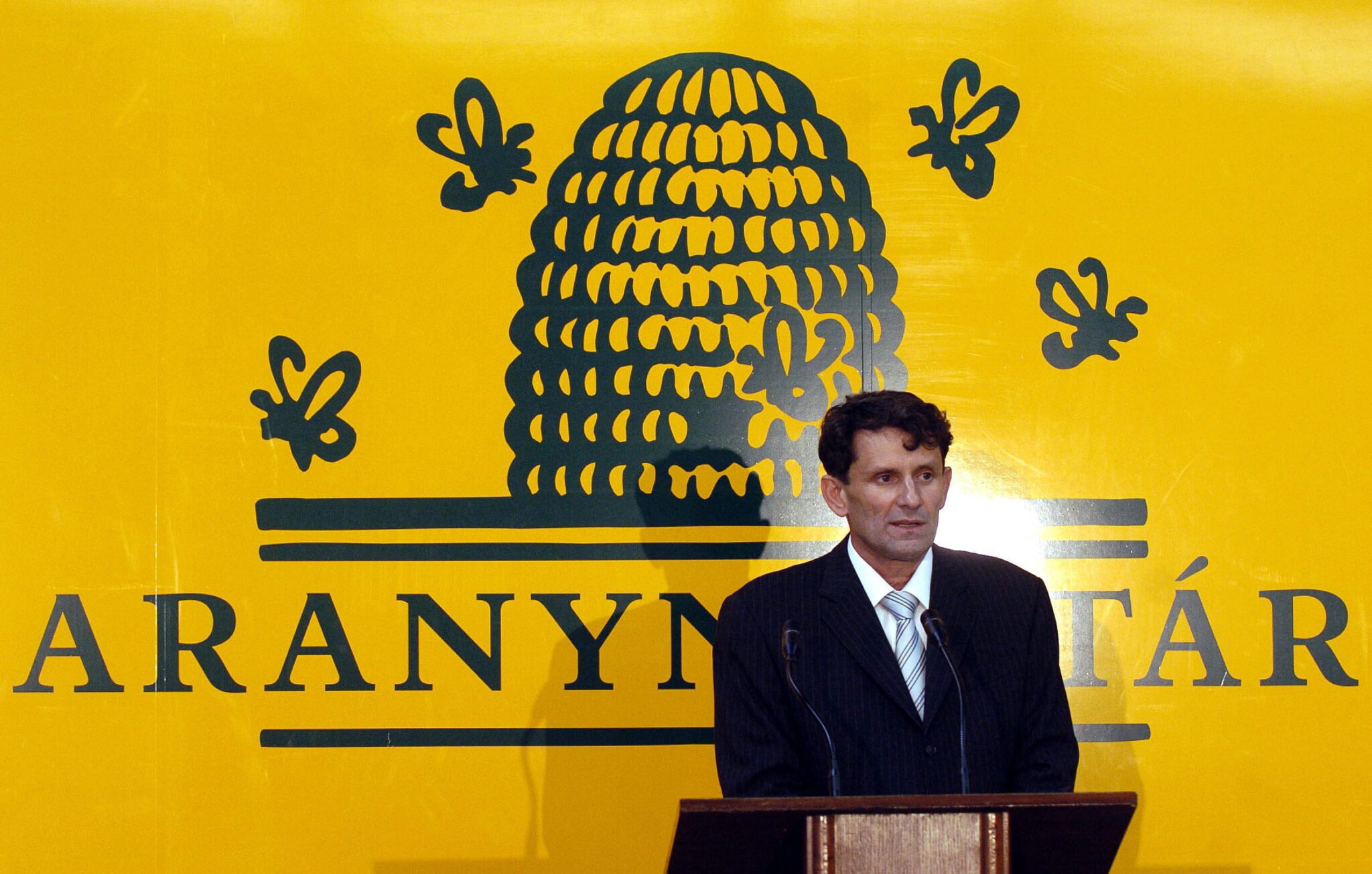
Owner Ferenc Takács speaks at the inauguration of the new honey processing plant of Aranynektár Kft. on 19 September 2007. (MTI Photo: László Beliczay)
The Fidesz government was even more generous in its support. In the autumn of 2020, when István Nagy was already Minister of Agriculture, the government awarded HUF 58 million in EU funding to develop the company’s production capacity. The total cost of the investment was just over HUF 83 million, 70 percent of which was covered by the EU money.
Two years later, at the end of 2022, the Dunavarsány honey plant received nearly HUF 1 billion in EU funding. The government granted HUF 970.4 million in EU funding for the project “Development of the honey processing plant of Fulmer GmbH in Dunavarsány”. The Minister of Agriculture István Nagy was present at the inauguration of the honey processing plant.
While the date of the application for the aid is 30 August 2021, the date the aid was awarded was 11 November 2022. The Minister of Agriculture István Nagy attended the inauguration of the processing plant on 18 November 2022.
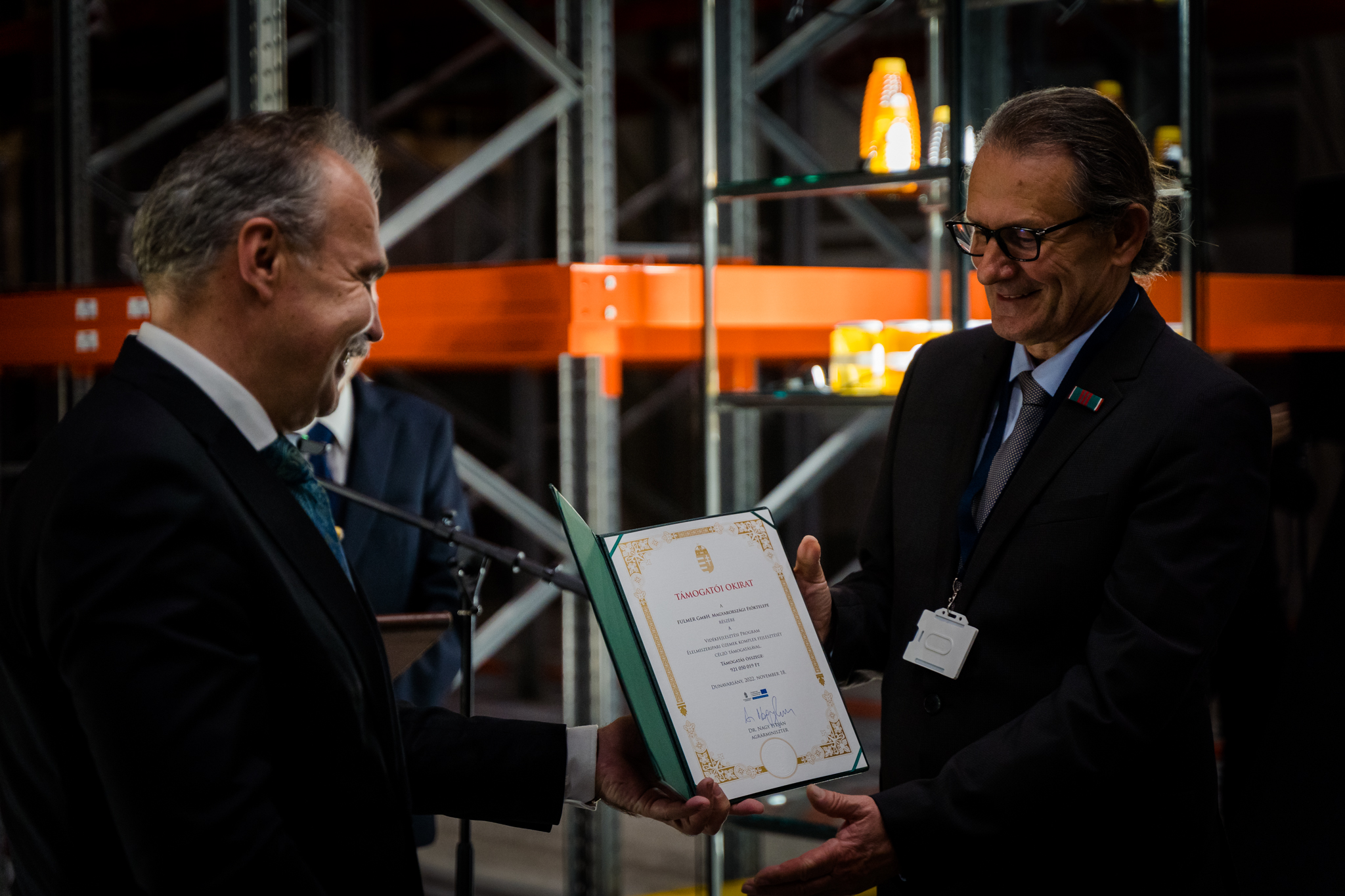
Minister of Agriculture István Nagy and Ferenc Takács/Fulmer in the honey processing plant in Dunavarsány on 18 November 2022 with the 921 million euro certificate of support (photo: Facebook page of Fidesz MP Zoltán Bóna)
This means that, less than a week after the government awarded the company the money, the subsidised development was inaugurated.
The annual net sales of Aranynektár Ltd ranged between HUF 500 and 650 million from 2016 to 2022, and its profit after tax ranged between HUF 17 and 360 million during this period. The two most profitable years for the 79-employee-strong company were 2017 and 2021, when it generated profits of HUF 238.5 million and HUF 354.6 million, respectively. By contrast, in 2022, a net turnover of HUF 577.4 million resulted in a profit of only HUF 17.8 million.
Another company, FULMER GmbH, received nearly HUF 1 billion in funding, and it’s significantly more successful. Its Hungarian branch, 34 employees strong, had an annual net turnover of between HUF 4.5 billion and HUF 7 billion between 2018 and 2022, and a net profit after tax of HUF 127 million in its weakest year. Two years have been particularly good, with profits of HUF 978 million in 2020 and HUF 1.1 billion in 2021.
After the publication of our story, Ferenc Fulmer told Atlatszo that he is not on good terms with Minister István Nagy, and that their previous working relationship ended more than 20 years ago, exactly 10 years before István Nagy would have appeared in national politics. According to Fulmer, the relationship between them today is entirely official, meaning that it was not their past relationship that led to the government’s decision on the Ukrainian honey issue.
Translated by Vanda Mayer. The original, more detailed Hungarian version of this story was written by Katalin Erdélyi and can be found here and here.
